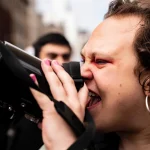In the early hours of Tuesday morning, a group of about 60 pro-Palestine protesters from Columbia University took over the university’s central Hamilton Hall building and renamed it Hind Hall in memory of Hind Rajab, 6-year old child who was killed in Gaza. In 1968, Hamilton Hall was also taken over by protesters. The move marks an escalation in the stand-off between Columbia administration and the students engaged in activism on campus against the ongoing genocide in Gaza. This escalation came hours after the university administration itself escalated with a threat to suspend all students still engaging in the encampments — and thus evicting them from student housing and barring them from student dining services. The university also announced it will not be divesting from Israel.
This new occupation — done by an autonomous group, according to Columbia University Apartheid Divest — comes after several other student protesters spread their protests to occupying buildings including at Princeton, Portland State University, and California State Polytechnic University, Humboldt, who held onto a hall for over a week. The state and university administrations have brutally repressed the students and encampments, leading to hundreds of arrests, countless suspensions, several recorded instances of police brutality, and state troopers being deployed against protesters at University of Texas at Austin and Emory University.
In response to this new occupation, Columbia has further locked down its campus — per student journalists at WKCR, only students who live on the Morningside Campus (the site of the encampment and the occupation) and essential employees are allowed to enter the area. Barnard College students — a subsidiary of Columbia University which is literally across the street from the Morningside Campus — have been banned from entering Columbia at all. This is clearly an attempt to isolate both the occupation and the encampment and cut them off from student and community support.
The cause the students are primarily fighting for — that Columbia divest from Israel — is an important one. It would represent a political and material challenge to the relationship between U.S. institutions and Israel. This fight also puts into question the relationship between university bureaucracies’ handling of money and investments and the student body. This fight poses that students should have a say. We can take that further: students, faculty, and staff should be running the university.
Another key demand of the movement at Columbia is amnesty for students who have been punished (including with suspensions) by the university for their activism around Palestine. Such attacks are a direct affront to the right to free speech. We must fight for amnesty by surrounding the student movement with broad support and fighting back these attacks at every turn.
It is vital that we demand that there be no repression of either the occupation or the encampment, that we fight against the new round of suspensions that Columbia. The last week has shown a rise in faculty engagement in protecting the encampments. This solidarity must be called on again to defend the students who are facing escalating repression. It is also important to call for support from the wider community, to run a broad democratic campaign that seeks to unite many sectors behind the defense of the democratic right to protest. The Columbia administration’s threat of mass suspensions yesterday showed that the university’s orientation, after a few days of negotiations, is now to repress the student protests out of existence. We must fight that with our full force.











